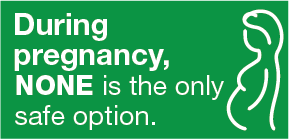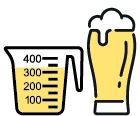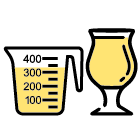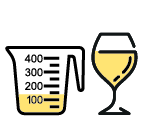
Alcohol
The Canadian Centre on Substance Use and Addiction’s (CCSA) Canada’s Guidance on Alcohol and Health was updated in January 2023. The guidance provides science-based information about the risks associated with alcohol consumption and encourages individuals to make informed decisions about its use.
According to the new guidance, an individual’s level of risk depends on how much alcohol they consume per week.
The continuum of risk associated with average weekly alcohol consumption

0 drinks per week = No risk

1 to 2 standard drinks per week = Low risk

3 to 6 standard drinks per week = Moderate risk

7 or more standard drinks per week = Increasingly high risk
While limiting consumption to 2 standard drinks or fewer per week can help avoid negative consequences, the guidance recommends that individuals count how many drinks they have in a week and gradually decrease their weekly intake. When pregnant, trying to get pregnant, or breastfeeding/chestfeeding, no amount of alcohol is safe.

What is considered a standard drink depends on the type and amount of alcohol

Beer: 341 mL (12 oz) of 5% alcohol

Cooler, cider, or ready-to-drink: 341 mL (12 oz) of 5% alcohol

Wine: 142 mL (5 oz) of 12% alcohol

Spirits: 43 mL (1.5 oz) of 40% alcohol
Convert your drinks into standard drink sizes using a standard drink calculator.
Reducing your alcohol consumption to maintain a healthy lifestyle
 The EOHU encourages individuals to use the new recommendations as a tool to evaluate their drinking habits and see if any adjustments need to be made to maintain a healthy lifestyle and reduce the risk of health issues associated with alcohol consumption.
The EOHU encourages individuals to use the new recommendations as a tool to evaluate their drinking habits and see if any adjustments need to be made to maintain a healthy lifestyle and reduce the risk of health issues associated with alcohol consumption.
The new research that the guidelines are based on highlights that there are substantial benefits to limiting one’s alcohol intake. Doing so can reduce one’s risk of developing multiple types of cancer, cardiovascular diseases, liver disease, and other harms associated with alcohol use.
The research also demonstrates that, contrary to popular opinion, modest consumption of alcohol offers no protection against heart disease, and that regular and heavy consumption can increase your risk.
Ultimately, the new guidelines are meant to raise awareness and encourage individuals to reduce their alcohol intake, as any reduction in alcohol use can be beneficial. If you drink, regardless of where you find yourself on the continuum of risk, less is better.
Some tips to help you reduce your alcohol intake
If you’re going to drink:
- Drink slowly
- Drink lots of water
- For every drink of alcohol, have one non-alcoholic drink
- Choose alcohol-free or low-alcohol beverages
- Eat before and while you’re drinking
- Plan ahead. Make arrangements to have a designated driver. If you didn’t plan ahead, call for a lift or stay overnight.
And remember, you can go out or participate in activities without drinking! This will help you have alcohol-free weeks if you choose to do so, and help you stick to the alcohol consumption limits that you’ve set for yourself.
Additional resources
- For more information on the CCSA’s guidance, take a look at their infographic and website.
- Knowing Your Limits with Alcohol: A Practical Guide to Assessing Your Drinking

